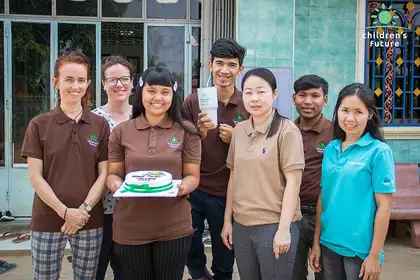
Kora Deverick (left) on Social Work Day in March 2020 with Children's Future International staff. Photo: Sophannak
Master of Applied Social Work student Kora Deverick jetted off in 2020 intending to make a difference to the livelihoods of Cambodian school children through her work-integrated learning placement before being halted by Covid-19.
A year on, she can now reflect on achieving her goal despite the setbacks from a global pandemic. Additionally, she is the proud recipient of the Aotearoa New Zealand Association of Social Workers Quality and Innovation award for social work education due to her exemplary work during her 60-day placement.
A serial volunteer, Ms Deverick’s interest in this placement developed whilst completing her Master’s research report where she found she was forming a keen interest in research, and understanding the importance of research-informed practice and vice-versa.
Ms Deverick expressed interest in Children’s Future International, a non-profit organisation managed by Massey University alumni Zoey Henley and Lee Henley (alumni and current PhD student), that works to protect some of the region’s most vulnerable children. Ms Deverick was offered a placement in Ek Phnom, a district of Battambang in northwestern Cambodia.
“A placement with Children’s Future International is a contributory one. They recognise that an international student will bring different areas of knowledge to the organisation, especially considering our privileged education options,” she says.
The several tasks she undertook included writing a research report on student absenteeism; how this contributes to school dropout, and what preventative approaches could help children to keep attending school.
She used various research methods and the information collected was used to inform the case management approach with the Education Advocacy (a team who support children within Children’s Future International services to remain in public school and continued education) in both English and Khmer.
“I'm glad I had this face to face time as it allowed for more informal conversations, and I could see how they interacted with children and families on a day to day basis,” she says.
Ms Deverick says as the Education Advocacy is relatively new, they wanted to develop their case management approach and create a clear pathway to support children through school and to also sustainably exit the service when needed.
“Having a clear and consistent pathway ensures resources are appropriately used and interventions reduced as soon as risks are reduced, therefore reducing service dependency.”
Ms Deverick left Cambodia five weeks into her placement due to the growing pandemic but continued to work on her placement tasks via zoom while the Education Advocacy phoned local teachers to continue the interview questions. Barriers such as cultural and language differences and unreliable phones and internet meant directly interviewing families and children in the community via zoom was not an option.
She says working between countries was difficult and she missed out on a lot of the nuances of culture and daily life. “This meant I felt more isolated, however, no less motivated because I was well supported and I knew what I was doing would be beneficial to real people.”
Her findings revealed that children are more likely to be absent from school to help with domestic tasks or when they are changing schools (equivalent of moving from primary to intermediate, or intermediate to high school). Children are more likely to return or stay in school if they have clear educational goals, and if the parents or guardians have a close relationship with the school.
Her recommendations, which were included in her placement report were to strengthen support during ‘changeover’ years, for example, continuing to host a parent-teacher afternoon, and ensuring regular goal-setting workshops and meetings were held, especially as children get older.
Ms Deverick says she gained many new skills from her placement, “it showed me in no uncertain terms how important it is to collaborate, include the staff and clients in the process (especially marginalised communities or those who are not ‘status quo’, e.g. children and indigenous groups), and ensure that the research includes applicable recommendations.”
On her return home, she co-authored an article with Associate Professor of Social Work, Kathryn Hay and Lee Henley titled: International social work placements: What happens when your government tells you to come home?.
Ms Deverick was nominated for the ANZASW award by her field educator Mr Henley and School of Social Work staff member Dr Hay. She says she shares her award with the Education Advocacy team and Children’s Future International, without whom this placement would not have been possible, and she is very grateful for the experience.
“I really hope it brings some attention to Children’s Future International and the differing experiences life brings in Cambodia, especially because COVID-19 continues to have devastating impacts.”
Mr Henley says the organisation continues to go well and Cambodia for a time had minimal COVID infections.
“The impact was from the collapse of the tourist trade, therefore families who were just surviving are now struggling. COVID is just starting to take hold now and we are moving into lockdowns and alcohol bans. A worry for a country with a nascent health system. There will of course be longer-term impacts and the future is currently rather unknown. We have managed well so far, a diversified funding stream has certainly helped," he says.